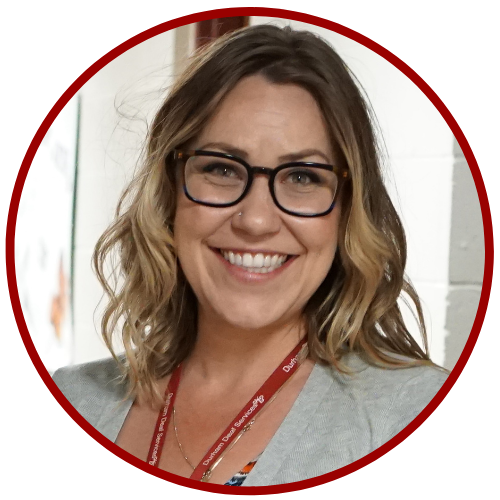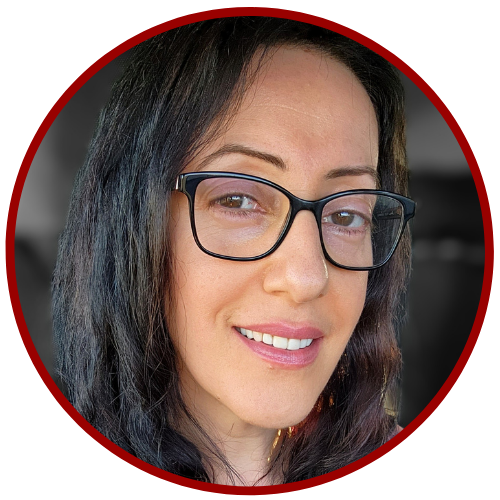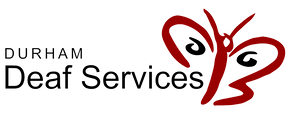Deaf Adult Upgrading Program
DDS provides a literacy program in American Sign Language for Deaf adults who want to improve their literacy skills in the following areas: reading, writing, numeracy/math, computers, and employment preparation.
Our program is hosted all year long and reflects the Ontario Adult Literacy Curriculum Framework (OALCF) six competencies plus improves knowledge, attitudes, and behaviors for the workplace provided in American Sign Language (ASL) to individuals that are culturally Deaf, oral deaf, deafened and hard of hearing.

Stefanie Gibbons
Literacy Coordinator

Behishta Mushtaq
Literacy Practitioner
Our Philosophy
The Deaf Adult Upgrading program (DAUP) philosophy and approach is bi-lingual and bi-cultural. Learners in DAUP will build literacy skills in both American Sign Language and English. Adult literacy learning is different than traditional formal educational environments. We take a pragmatic and realistic approach to learning independence and employment skills. Our program is funded by the Ministry of Labour, Training, and Skills Development, and those enrolling in our program will learn applicable knowledge for their everyday lives. Learning is most effective when practitioners implement and develop learning plans that are creative and match the needs of individual learners.
Our Program
DAUP provides individuals with essential employment, independence, and post-secondary literacy skills. Our program focuses on improving the learner’s ability to read and understand language related to everyday literacy. The majority of our learners are culturally Deaf, and newcomers to Canada with limited English and ASL skills. DAUP does work closely with the Canadian Hearing Services (CHS) Employment Service for any upcoming workshops and “walk-in” support with their employment consultant.
Eligibilty
In order to be eligible for our DAUP classes, a leaner:
1) Must be 18 years old or older to enter the program.
2) Must attempt to complete the initial assessment.
3) Must be an Ontario resident, have Canadian Citizenship or Permanent Resident status, and a SIN number to register.
4) Must be able to set an employment or independence goal.
5) Must be motivated to carry out the goals set in the training plan.
Goal Paths
Employment goal path is right for you if you are interested in:
Setting goals, wanting to explore career choices, assessing your strengths and gaps in seeking/retaining employment
- Wanting to work toward further education in your field, training, certification, or setting a personal goal for career advancement in your current employment.
- Working on interpersonal/soft skills for employment.
- Knowing your employment rights and how to self-advocate.
- Preparing for employment – resumes, cover letters, interview skills, workplace culture, diversity training, hearing vs. deaf culture in the workplace.
Independence goal path is right for you if you are interested in:
- Being motivated to live independently and increasing social skills to interact with service providers and companies for independent living.
- Self-improvement strategies to be self-sufficient.
- Learning English and ASL in a bi-lingual, bi-cultural environment.
Post-secondary goal path is right for you if you are interested in:
- Being motivated to set goals, understand postsecondary requirements, and managing student life.
- Improving literacy gaps needed to enter post-secondary education in your chosen area of study.
- Knowing your rights and how to advocate accommodation in education settings.
About the OALCF
Knowledge + Skills + Attitudes
= Competencies
Competencies are the knowledge, skills, and attitudes that people need to carry out everyday tasks successfully. Put together knowledge, skills and attitudes are called: Competencies
The OALCF has six competencies:
A) Finding and Using Information
B) Communicating Ideas and Information
C) Understand and Use Numbers
D) Use Digital Technology
E) Manage Learning
F) Engage With Others
Competency A: Find and Use Information
A1: Reading Continuous Text
A2: Interpreting Documents
A3: Extract Information from Digital/Broadcast Media
Competency B: Communicate Ideas & Information
B1: Interact with Others
B2: Write Continuous Text
B3: Complete and Create Documents
Competency C: Understand and Use Numbers
C1: Manage Money
C2: Manage Time
C3: Measurements
C4: Manage Data
Competency D: Use Digital Technology
D1, D2, & D3: Use Digital Technology
Competency E: Manage Learning
Competency F: Engage with Others
What is Literacy?
Traditionally Literacy has meant the ability to read and write. In the modern day we have expanded the meaning to include the ability to use numeracy, images, language, computers, and other basics means to understand, communicate, gain useful knowledge, solve mathematical problems and use the dominant symbol systems of a culture.
Deaf Literacy Initiative has many essential resources for literacy learning. Access them here.
Looking for a LBS or LINC program? See what programs are available here.
Video provided by Deaf Literacy Initiative
Social Enterprise
Social enterprise gives learners the opportunity to participate in a project that is bigger than themselves. To develop a business project and see how their skills can be valued, how their involvement matters. As a team, learners begin to develop a business project that benefits their community and themselves as well.
Upcoming Events
DDS and the DAUP hosts many educational events throughout the year. To see our future events, visit our event calander.
Ask Us a Question
Testimonials
What first made me decide to come to DDS was when I saw a flyer. I asked a friend and they told me to come to DDS. I thought I would join for Wednesdays only at the beginning. I loved classes so much that I became a full time student taking all that DDS offered. I love the culinary classes offered best. I learn how to cook. I also love the business project, creating items to sell with the class. I have told other friends to come to DDS like my friend told me. My best experience has been socializing with other Deaf like myself. DDS has helped me improve to better prepare for employment with my math and English skills as well helped me with working with computers.
I’m retired. I didn’t think there was a way for me to continue learning. My sister told me about Durham Deaf Services. I had yet to move to Durham when she told me, but I’m glad I came once I moved to Oshawa. I still had a strong desire to learn. Now I feel confident with my English communication. My daughter even made comment about how my English has improved during our text conversations. DDS has aided me to communicate better for my daily life as well given me a place to continue to keep my learning and mind fresh. I still have lots to learn even though I’m retired. I enjoy classes here.
I felt awkward and unsure of myself before joining DDS. I needed to learn as I struggled with school growing up. I didn’t have the opportunity to go to school like others. My education was very low, I didn’t know or understand English, finances or budgeting. DDS is the best for me! The skills offered are important to me and I like the staff here. I get the information in ASL. My biggest success that makes me very proud is that I was able to independently take the Durham region transit. I was scared to navigate the city bus system. I now daily transfer different busses to come to class and get around the city. DDS you’ve helped me to improve my skills for day to day living. I’m getting closer to my goal of living independently and have a place all my own. Thank you so much.
Durham Deaf Services
900 King Street East
Oshawa, Ontario L1H 1H2
Phone: (905) 579-3328 Voice/Text
Fax: (905) 728-1183 Email: info@durhamdeaf.org
Office Hours:
Mon - Thurs
8:30 - 4:30
Fri - Sun: closed
